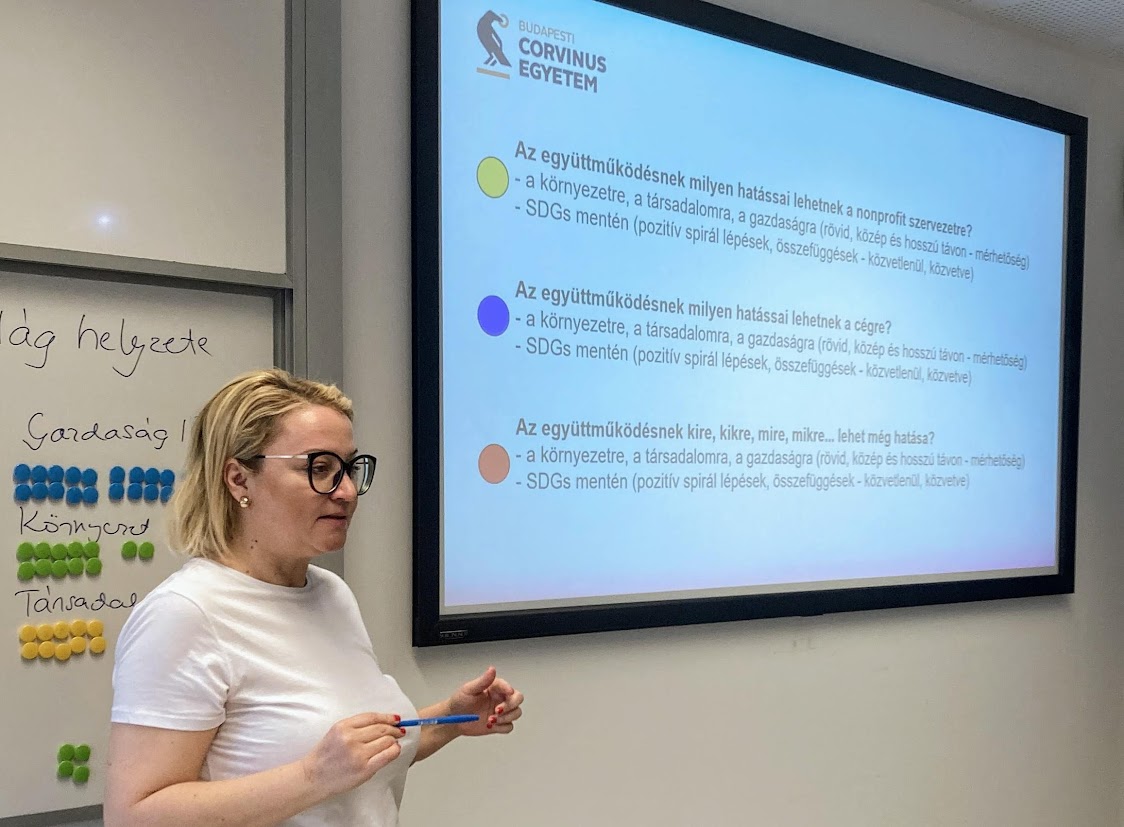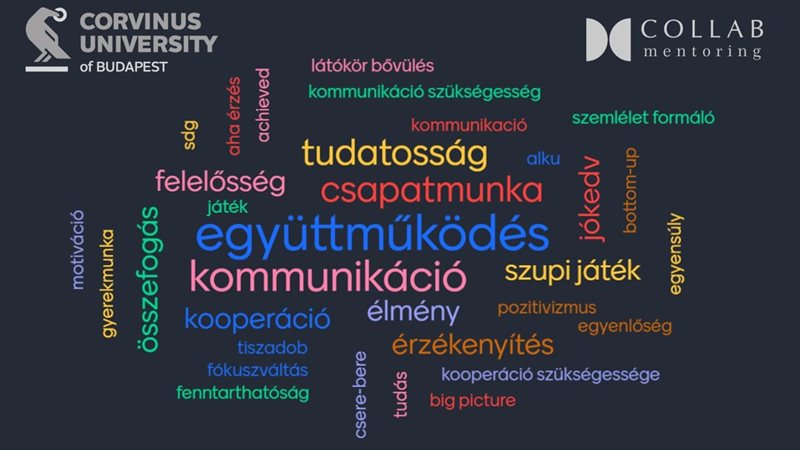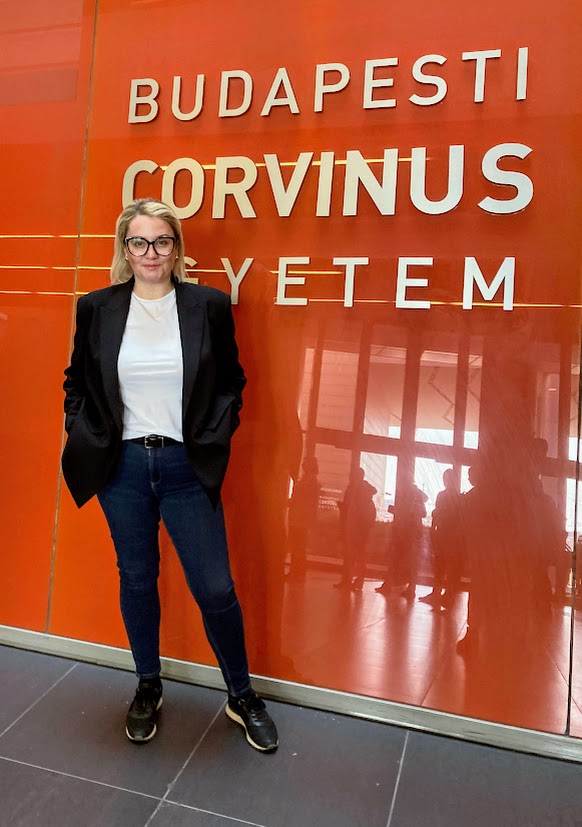“We are not in competitors on this Planet, but fellow humans, along with all other living beings”

Third-year students from Corvinus University’s Business and Management, specializing in sustainability management, participated in a sustainability program brought to the university by the Collab Mentoring team. The experiential program develops an approach to sustainability through gamification, laying the groundwork for the subsequent workshop where participants work together to find solutions to specific challenges.
The program was facilitated by Collab’s Zsuzsanna Fodor and sustainability expert Zsuzsanna Buzás, and the aim of the session was to familiarize participants with the workings and dilemmas of the UN Sustainable Development Goals. The 2030 SDGs Game board game was created by Japanese developers and has since been used as a game-based learning tool by official session facilitators around the world.
“Collaboration is a fundamental and perhaps the most important condition for sustainability, which, among other things, builds community, builds teams, inspires cooperation and activism,” said Zsuzsanna Buzás, who led the workshop, in a previous interview about the program.
I have also written a subjective account of the game and the dilemmas that arose during the game, which you can read below:
Implementing oil drilling and increasing workplace productivity – with these two projects and raising money as my objective. I could not have been more far away from myself, especially about sustainability, to start playing a board game about the SDG targets.
So, at the beginning of the game, I had a dilemma in my head: was this really going to be a greenwashing game? How can I play along goals that are so far from my personality? Oil project, really? There was even a thought in my head that I could be a saboteur of some sort in the game, playing by rules not drawn for me. In the end, the best decision was to keep an open mind and let the game unfold.

In the first round, we wiped out the planet
The game consists mainly of cards and tokens, so it aims to introduce participants to the dilemmas of the UN Sustainable Development Goals in a simple, straightforward way. Each participant was given a goal card to represent during the game: for example, I was given a goal to raise a certain amount of money, while others had to collect projects they had completed or had to do something environmentally friendly.
The project cards contained a detailed description of what the project was, how much it would cost and what it would achieve once completed. Three basic things were needed to carry out the project: money and time, which could also be collected on cards, and the natural, social and economic capacity. This capacity was indicated by tokens on a board, the amount of which varied according to the ‘development’ of the area. And here was the twist in the game.
For most of the teams, the first thing they did was to use the resources (money and time) they had to start as many projects as possible, without looking at what they were about. It could be anything from oil drilling to developments that could cause either environmental or social damage, because these showed the quickest short-term returns.
My saboteur side kicked in, of course, and when I saw the rapid degradation of nature, I tried to break away from the goals the game had given me. Or I would have tried, but I couldn’t: I just realised that almost anything I could do would give me enough money to achieve the goal. So, I started collecting the less financially rewarding green projects left by others, and the oil project was happily hidden among our cards. I wasn’t alone, of course, others were concerned about nature and society, but in the unregulated turmoil that was more like a noisy market, the process of destruction for profit seemed unstoppable.
Then, at some point, the process reached a turning point: the tokens for natural and social capital were running out, but most projects could only be implemented if there were enough tokens. We realised that we had brought our fictional planet to zero, just as we were doing in reality, and there was no progress from there, whatever that meant.
Changing perspectives
Halfway through the game it looked like we were going to lose. It was good to take a break and reflect, which was a very important part of the process. We talked about how everyone had experienced the first part and, more importantly, we started to communicate more consciously with each other.
We also realized, for example, that a lot of individual goals seemed to have been achieved, we had a lot of money, and our economy was flourishing. But what we hadn’t realised was that, in addition to individual goals, our map of goals included a collective goal: to do everything in a way that ensures the long-term well-being and sustainability of others and our environment. And we were very bad at that, as we are in the world today.
Pausing, thinking and reflecting helped us to redefine our goals and change our perspective. In the second round, this completely changed the tone of the game. The initial hustle and bustle were replaced by more conscious communication and action, and more and more people began to think beyond their own goals to collective success. Nature restoration projects were undertaken, and more people became concerned about the state of society.
At first, of course, there was concern about what would happen to the economy, but not only did it not collapse, it actually became more stable towards the end of the process. We went from a path of infinite growth to a more balanced situation between the three areas. By the end of the game, we had virtually restored society and nature without the decline of economic development. In other words, we did not fall to ground, and profit and economic development for its own sake were replaced by an approach that takes into account the well-being of the community as well as individual goals.
We won, and we didn’t even need autocratic rules
After the chaos of the first part, we had little hope that this situation could be reversed, since the experience was that everyone made decisions according to their own goals and interests. Reflection was able to change that, suddenly we were not a bunch of individuals but a community, and we realized we needed to communicate with each other a lot more.
We have moved to a much more sustainable way of working, without an authority figure, a person who stands out and says we should do this or that to achieve the goal. The process remained decentralized, but there was much more contact and shared reflection between members of the group. Those who were on track with their goals started going around the room to see where they could help others, but there were also times when we combined resources to create new projects in a positive direction.
For me, the first part symbolized the economic growth and profit-oriented, less nature- and society-conscious approach that has led to the situation we are in today. And the second part was the hope that, after a change of perspective, there could be real change through democratic processes based on the cooperation of autonomous individuals and communities.
Looking back, I smile when I think of the first time, I thought I had to do an oil project. The game is only seemingly so strict, but in reality, you have much more room to make the rules yourself, and you don’t even have to be a saboteur to do it.
And the second part confirmed my enthusiasm for subsidiarity and the effectiveness of bottom-up approaches. The game taught me how important these values are, and that a successful network requires conscious, empathetic and collaborative communication. We are not competitors on this planet, but fellow human beings, along with all other living creatures.

Written by: Máté Kovács
In May, we relaunched the Sustainability Theme of the Month project at Corvinus, focusing on community action. Students were also able to learn about this community action in a course workshop, which is presented here. Details about the project and other activities can be found here.